讲座用英语怎么说
高中英语动词
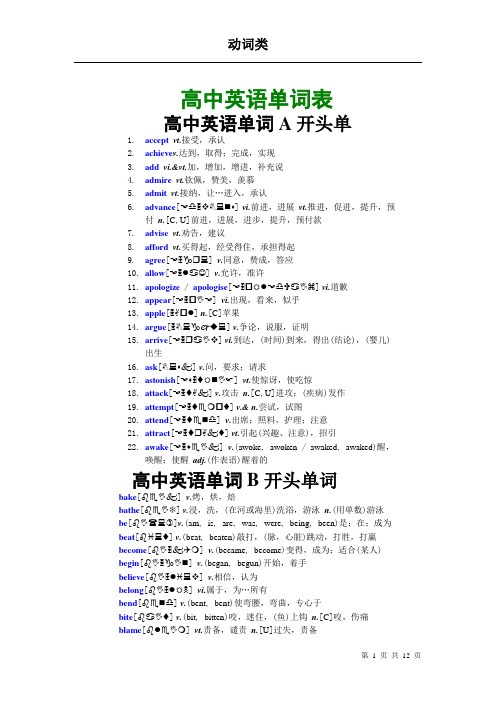
高中英语单词表高中英语单词A开头单1.accept vt.接受,承认2.achieve v.达到,取得;完成,实现3.add vi.&vt.加,增加,增进,补充说4.admire vt.钦佩,赞美,羡慕5.admit vt.接纳,让…进入,承认6.advance[☜♎❖⏹♦] vi.前进,进展vt.推进,促进,提升,预付n.[C,U]前进,进展,进步,提升,预付款7.advise vt.劝告,建议8.afford vt.买得起,经受得住,承担得起9.agree[☜♑❒] v.同意,赞成,答应10.allow[☜●♋☺] v.允许,准许11.apologize / apologise[☜☐●☜♎✞♋✋] vi.道歉12.appear[☜☐✋☜] vi.出现,看来,似乎13.apple[ ✌☐●] n.[C]苹果14.argue[ ♑◆] v.争论,说服,证明15.arrive[☜❒♋✋❖] vi.到达,(时间)到来,得出(结论),(婴儿)出生16.ask[ ♦] v.问,要求;请求17.astonish[☜♦♦⏹✋☞] vt.使惊讶,使吃惊18.attack[☜♦✌] v.攻击n.[C,U]进攻;(疾病)发作19.attempt[☜♦♏❍☐♦] v.& n.尝试,试图20.attend[☜♦♏⏹♎] v.出席;照料,护理;注意21.attract[☜♦❒✌♦] vt.引起(兴趣、注意),招引22.awake[☜♦♏✋] v.(awoke, awoken / awaked, awaked)醒,唤醒;使醒adj.(作表语)醒着的高中英语单词B开头单词bake[♌♏✋] v.烤,烘,焙bathe[♌♏✋❆] v.浸,洗,(在河或海里)洗浴,游泳n.(用单数)游泳be[♌✋☎✆]v.(am, is, are, was, were, being, been)是;在;成为beat[♌♓♦] v.(beat, beaten)敲打,(脉,心脏)跳动,打胜,打赢become[♌✋✈❍] v.(became, become)变得,成为;适合(某人) begin[♌✋♑✋⏹] v.(began, begun)开始,着手believe[♌✋●♓❖] v.相信,认为belong[♌✋●☠] vi.属于,为…所有bend[♌♏⏹♎] v.(bent, bent)使弯腰,弯曲,专心于bite[♌♋✋♦] v.(bit, bitten)咬,迷住,(鱼)上钩n.[C]咬,伤痛blame[♌●♏✋❍] vt.责备,谴责n.[U]过失,责备blow[♌●☜☺]v.(blew, blown)吹,刮风,吹气n.[C]打,打击boil[♌✋●] v.(水等)沸腾;(水)开,用开水煮;使(水等)沸腾born[♌⏹] v.(动词bear的过去分词)出生adj.天生的,生来的borrow[ ♌❒☜☺] v.(向别人)借,借用bother[ ♌❆☜] v.& n.打扰,烦扰,麻烦break[♌❒♏✋] v.(broke broken)打破,折断,打碎n.[C]休息breathe[♌❒♓❆] v.呼吸bring[♌❒✋☠] vt.(brought, brought) 带来;传到;拿来;引起build[♌✋●♎] v.(built, built)建筑(造);建设(立)burst[♌☜♦♦] v.(burst, burst)(使)破裂,突然发生,爆炸n.[C](感情等的)爆发bury[ ♌♏❒✋] v.埋,埋葬buy[♌♋✋] v.(bought, bought) 购买can[ ✌⏹☜⏹]v.& aux. (could)能够,可以,可能,会n.[C](美)罐头,听头,一罐之量catch[ ✌♦☞] v.(caught, caught) v.change[♦☞♏✋⏹♎✞] v.改换,改变;更换,兑换n.[C,U]变化;零钱;找头chat[♦☞✌♦] v.& n.聊天,闲谈check[♦☞♏] v.检查,核对;寄存n.[C]检查,核对;(美)支票(=英国的cheque);(饭馆等的)账单choose[♦☞◆] v.(chose, chosen)挑选;选举circle[ ♦☜●] v.环绕,盘旋n.[C]圆,圈子clap[ ●✌☐] v.鼓掌,拍手n.[C]鼓掌声,拍手声climb[ ●♋✋❍] v.爬,攀登n.[C]攀登close[ ●☜☺] v.关,闭adj.& adv.[ ●☜☺♦] 近,靠近collect[ ☜●♏♦] v.收集,搜集;领取;收钱;使(思想)集中comb[ ☜☺❍] v.梳n.[C]梳子come[ ✈❍] v.(came, come) 来,到达,出现;开始compare[ ☜❍☐☪☜] v.比较;比喻,比作;比得上congratulate[ ☜⏹♈❒✌♦☺●♏✋♦] vt.祝贺,庆贺,恭喜connect[ ☜⏹♏♦] v.连接,相通,联想,衔接consider[ ☜⏹♦✋♎☜] v.考虑;把…看作;认为contain[ ☜⏹♦♏✋⏹] vt.包含,包括;装,容纳continent[ ⏹♦✋⏹☜⏹♦] n.[C]大陆,大洲continue[ ☜⏹♦✋⏹◆] v.继续,连续control[ ☜⏹♦❒☜☺●] v.& n.控制,支配cook[ ☺] v.烹调,煮,烧n.[C]厨师,炊事员could[ ☺♎] v.aux.能,可能count[ ♋☺⏹♦] v.计数,计算,视为cry[ ❒♋✋] v.喊叫,哭n.[C]叫喊,哭声cure[ ☺☜] v.& n.治疗,痊愈cut[ ✈♦] v.(cut, cut)& n.切,剪,割,伤口高中英语单词D开头单词dance[♎⏹♦] v.& n.跳舞,舞会dare[♎☪☜] v.(用作情态动词或实义动词)敢decide[♎✋♦♋✋♎] v.下决心,决定declare[♎✋●☪☜] vt.声明,断言;宣布defeat[♎✋♐♓♦] vt.击败;战胜;使落空,使受挫n.[C,U]失败,击败defend[♎✋♐♏⏹♎] v.防守,保卫;辩护,辩解deliver[♎✋●✋❖☜] vt.投递,传送demand [♎✋❍⏹♎] vt.要求,需要n.[C,U]要求;需要depend[♎✋☐♏⏹♎] vi.依靠,指望describe[♎✋♦❒♋✋♌] vt.描述;叫做desert2[♎✋☜♦] vt.舍弃,遗弃design[♎✋♋✋⏹] v.设计;计划 [C,U]设计;企图desire[♎✋♋✋☜] vt.期望,要求n.[U,C]意欲,要求destroy[♎✋♦♦❒✋] vt.毁坏,毁灭determine[♎✋♦☜❍✋⏹] v.决定,决心develop[♎✋❖♏●☜☐] v.发展;培养,发扬;开发;患(病);冲洗(照片)devote[♎✋❖☜☺♦] vt.把…奉献(给),致力于;把…专用于die[♎♋✋] v.死;渴望dig[♎✋♑](dug, dug) v.挖,掘disappoint[ ♎✋♦☜☐✋⏹♦] vt.使失望discover[♎✋♦✈❖☜] vt.发现discuss[♎✋♦✈♦] vt.讨论disturb[♎✋♦♦☜♌] vt.打扰;弄乱dive[♎♋✋❖] vi.& n.跳水,潜水,俯冲divide[♎✋❖♋✋♎] vt.分,划分,分裂,(数学用语)除do[♎◆♎☜](did, done) v.做,干,办,为;有益,产生效果;尽(力);处理,收拾,洗刷,整理;(对)适合,行,可以;(用于构成主要动词的否定式或疑问式、代替重复出现的主要动词或谓语部分、构成倒装句等) (用复数)双打v.(使)加倍,(使)翻番draw[♎❒] v.(drew, drawn)画,绘制;拖,拉,抽出drink[♎❒✋☠] v.(drank, drunk)喝饮(酒) n.[U,C]饮料;酒drive[♎❒♋✋❖]v.(drove, driven)驾驶,开(车);驱赶,迫使dry[♎❒♋✋] v.擦干,弄干,变干adj.干的,干燥的;干涸的高中英语单词E开头单词earn[☜⏹] vt.赚得;博得;赢eat[♓♦] v.(ate, eaten)吃employ[✋❍☐●✋] vt.雇用,使用empty[ ♏❍☐♦✋] adj.空的vt.倒空encourage[✋⏹✈❒✋♎✞] vt.鼓励enjoy[✋⏹♎✞✋] v.喜欢,欣赏enter[ ♏⏹♦☜] v.进入,参加envy[ ♏⏹❖✋] vt.& n.羡慕;忌妒escape[✋♦♏✋☐] n.& vi.逃脱,逃跑,漏出event[✋❖♏⏹♦] v.[C]事件,大事;(比赛的)项目examine[✋♑✌❍✋⏹] vt.检查;询问excite[✋♦♋✋♦] vt.使兴奋,使激动excuse1[✋♦◆] v.原谅;宽恕exist[✋♑✋♦♦] vi.存在,生存expect[✋♦☐♏♦] vt.期待,预期;以为explain[✋♦☐●♏✋⏹] v.解释;说明explode[✋♦☐●☜☺♎] v.(使)爆炸,(使)发脾气exploit[✋♦☐●✋♦] vt.剥削;开发,开采express[✋♦☐❒♏♦] vt.表达,表示adj.快速的,特殊的n.快车,快递,专使adv.乘快车,以快递方式face2[♐♏✋♦] v.面向,面对fail[♐♏✋●] v.失败,不及格fall1[♐●] n.&v.(fell, fallen)落下,跌倒;倒下,下降fasten[ ♐♦⏹] v.闩;栓住;捆;系fear[♐✋☜] n.&v.害怕,恐惧,担心feed[♐♓♎](fed, fed) v.喂(养),饲(养),供养;吃feel[♐♓●] v.(felt, felt)摸,触;感觉fetch[♐♏♦☞] v.取来,带来;去取fight[♐♋✋♦] v.(fought, fought)打仗,打架;与…打架n.[C]战斗,斗争find[♐♋✋⏹♎] v.(found, found)找到,发现;感到;查明finish[ ♐✋⏹✋☞] v.结束,完成fit[♐✋♦] v.(使)适合,(使)符合;安装adj.适合的;胜任的;健康的n.适合;合身(的衣服)fix[♐✋♦] vt.使固定;确定,决定;准备,安排;修理flash[♐●✌☞] v.闪亮,(使)闪现n.[C]一闪,闪光;转瞬间float[♐●☜☺♦] v.(使)浮动,(使)漂浮,飘动flood[♐●✈♎] vt.淹没,使泛滥,充斥n.[C]洪水,洪灾flow[♐●☜☺] vi.流,流动follow[ ♐●☜☺] v.跟随;(表示时间,顺序等)接着;遵循,理解forbid[♐☜♌✋♎](forbade / forbad, forbidden) vt.禁止;不许force[♐♦] vt.强迫,迫使n.[U,C]力量;武力 (常用复)军队,势力forget[♐☜♑♏♦] v.(forgot, forgotten)忘记,忘掉forgive[♐☜♑✋❖] v.饶恕;豁免,原谅,宽恕found[♐♋☺⏹♎] v.成立,建立freeze[♐❒♓]v.(froze, frozen)使冻结,结冰;凝固frighten[ ♐❒♋✋♦⏹] vt.吓唬,使惧怕fry[♐❒♋✋] v.油煎,油炸,油炒(地);较远的(地) v.增进,推进future[ ♐◆♦☞☜] n.[C,U]将来,前途adj.将来的,未来的高中英语单词G开头单词gain[♑♏✋⏹] v.获得;获益,增加;(钟、表)走快n.[C]收获,收益gather[ ♑✌❆☜] v.聚集,集合;收集,采摘get[♑♏♦] v.(got, got)成为,变得,使得;得到,收到;具有;到达give[♑✋❖](gave, given) v.给,给予,赠给,引起glance[♑●⏹♦] v.& n.一瞥,扫视,瞥见go1[♑☜☺]v.(went, gone) 去,行走;变为;处于…的状态;(机器等)运转;通到;相配;从事(活动)graduate[ ♑❒✌♎☺♏✋♦] v.毕业n.[ ♑❒✌♎✞☺✋♦] [C]大学毕业生,毕业生greet[♑❒♓♦] vt.问候,向…打招呼grow[♑❒☜☺] v.(grew, grown)种植;生长;渐渐变得guess[♑♏♦] v.& n.猜,猜测hang[♒✌☠]v.绞死,上吊;悬挂,吊着happen[ ♒✌☐☜⏹] v.(偶然)发生;碰巧harm[♒❍] vt.伤害,损害n.伤害,损害hate[♒♏✋♦] v.憎恨;不愿,不喜欢have[♒✌❖] v.(had, had)有;吃;喝;进行;经受;使v.aux.(构成完成时态)hear[♒✋☜]v.(heard, heard)听,听见;听说;得知hide[♒♋✋♎] v.(hid, hidden)隐蔽,把…藏起来hit[♒✋♦](hit, hit) v.打,击中;到达;侵袭hold[♒☜☺●♎](held, held) v.拿,抱,握;举行;容纳;持续n.(用单数)掌握,把握hope[♒☜☺☐] v.& n.希望hurry[ ♒✈❒✋] v.& n.赶紧,急忙hurt[♒☜♦]v.(hurt, hurt)使受伤,伤害,疼痛高中英语单词I开头单词imagine[✋❍✌♎✞✋⏹] vt.想像,设想improve[✋❍☐❒✞❖] vt.改进,改善,提高include[✋⏹●◆♎] vt.包括increase[✋⏹❒♓♦] v.增加,增多,增大n.[C,U]增加infer[✋⏹♐☜] vt.推断insist[✋⏹♦✋♦♦] v.坚持interrupt[ ✋⏹♦☜❒✈☐♦] v.打断,打扰;中断introduce[ ✋⏹♦❒☜♎◆♦] vt.介绍,引进invent[✋⏹❖♏⏹♦] vt.发明,创造;捏造,编造invite[✋⏹❖♋✋♦] vt.邀请,招待高中英语单词J开头单词join[♎✞✋⏹] v.加入,参加;连接,联合高中英语单词K开头单词keep[ ♓☐] v.(kept, kept)保存,保持(某种状态),继续kick[ ✋] v & n.踢kill[ ✋●] v.(被)杀死,(被)弄死;消磨(时间)kiss[ ✋♦]v.& n.[C]吻,接吻knock[⏹] v.& n.[C]敲,打;相撞know[⏹☜☺] v.(knew, known)懂得;了解;知道;认识lack[●✌] v.& n.[U,C]缺乏,缺少,没有land[●✌⏹♎] vt.(使)登陆,(使)上岸,(使)降落n.[U]陆地,土地laugh[●♐] v.笑,大笑;嘲笑n.[C]笑,笑声lay[●♏✋](laid,laid) v.放,摆;使处于某种状态;产卵lead[●♓♎](led, led) v.领导,带领;领先,率先;过…生活learn[●☜⏹] v.(learnt, learnt或learned, learned) 学习;听说,获悉least[●♓♦♦] adj.& n.最小(的);最少(的) adv.最少地leave[●♓❖] v.(left, left)离开;把…留下;剩下lecture[ ●♏♦☞☜] v.&n.[C]演讲,讲座,讲课lend[●♏⏹♎] v.(lent, lent)把…借给let[●♏♦] v.(let, let)让,允许;出租liberate[ ●✋♌☜❒♏✋♦] vt.解放,释放,使自由lie1[●♋✋] vi.说谎n.[C]谎言,假话lie2[●♋✋](lay, lain) vi.躺,卧;平放;位于,在…位置;保持…状态lift[●✋♐♦] vt.提起,举起n.[C]升举,提;(英)电梯;搭便车like1[●♋✋] v.喜欢;想要listen[ ●✋♦⏹] vi.听live1[●✋❖] v.活,生存;生活,居住;过…样的生活lose[●◆] v.(lost, lost)丢失,丧失;输love[●✈❖] v.& n.爱,热爱,很喜欢lunch[●✈⏹♦☞] n.[U]午餐,午饭高中英语单词M开头单词make[❍♏✋] v.(made, made)做,制造;使得;(使)成为manage[ ❍✌⏹✋♎✞] v.管理,经营;设法对付march[❍♦☞] v.& n.前进;进军marry[ ❍✌❒✋] v.嫁,娶,结婚may[❍♏✋]v.aux.(might)可以,也许,可能mean[❍♓⏹] v.(meant, meant)想要,意味着meet[❍♓♦] v.(met, met)碰到;相识,被(首次)介绍;会合;遭到;满足n.[C]集会;运动会mend[❍♏⏹♎] v.修理,修补mention[ ❍♏⏹☞☜⏹] v.提到,说起might[❍♋✋♦] v.aux.(may的过去式,表推测或允许)可能,可以;(代替may,礼貌地请求)可以;(表推测)可能miss[❍✋♦] v.想念,惦记;错过,未看见,发现…不见了mix[❍✋♦] v.混和,搅和move[❍✞❖] v.动,移动;感动;搬家n.(用单数)移动;搬家;下棋murder[ ❍☜♎☜] v.谋杀n.[C,U]谋杀(案)must[❍✈♦♦]v.aux.必须,需要;一定是,必定是n.必须做的事,不可少的事物nod[⏹♎] n.& v.点头obey[☜♌♏✋] v.服从,遵守;听话occur[☜☜] vi.出现;存在;发生;想到offer[ ♐☜] v.& n.提供;提出;出价oil[ ✋●] n.[U]油v.加油operate[ ☐☜❒♏✋♦] vt.操作,运转vi.对…施行手术organize / organise[ ♑☜⏹♋✋] vt.组织,安排vi.组织起来ought[ ♦] v.aux.应当,应该owe[☜☺] vt.欠(钱);应感激;应给予;归功于高中英语单词P开头单词pass[☐♦] v.传,递;经过,通过;度过(时间),(时间)流逝n.[C]关口;及格(证),通行证pay[☐♏✋] v.(paid, paid)付钱;发工资,给…报酬n.[C]工资perform[☐☜♐❍] v.做,实行,执行;表演permit[☐☜❍✋♦] v.许可,允许n.[C]许可证,执照persuade [☐☜♦♦♏✋♎] v.说服,劝说pick[☐✋] v.摘;挑选;扒窃picnic[ ☐✋⏹✋] v.(picnicked, picnicked) 野餐n.[C]野餐play[☐●♏✋] v.玩,做游戏;打球n.[C,U]玩耍;戏剧pour[☐] v.倒,注,灌;流出,倾泻(雨等倾盆而下)practise / practice[ ☐❒✌♦✋♦] v.实践,实施;惯做,常做;练习prefer[☐❒✋♐☜] vt.(preferred, preferring)宁可,宁愿,更喜欢prepare[☐❒✋☐☪☜] v.准备,预备press[☐❒♏♦] v.压,按,挤;熨,熨平;紧迫n.(常用单)压,推,压挤;(连用the)新闻界 [C]出版社;印刷厂;熨烫社pretend[☐❒✋♦♏⏹♎] v.假装,假扮;自称prevent[☐❒✋❖♏⏹♦] v.防止,预防print[☐❒✋⏹♦] vt.印刷;痕迹;刊载,出版produce[☐❒☜♎◆♦] v.产生,生产,制造pronounce[☐❒☜⏹♋☺⏹♦] v.发音,宣告,断言protect[☐❒☜♦♏♦] vt.保护prove[☐❒◆❖] v.证明,证实,证明是provide[☐❒☜❖♋✋♎] v.提供pull[☐☺●] v.拉,拖,拔punish[ ☐✈⏹✋☞] vt.惩罚,处罚push[☐☺☞] v.&n.[C]推put[☐☺♦] v.(put, put)放,摆高中英语单词Q开头单词quarrel[ ♦❒☜●] v.& n.[C]争吵rain[❒♏✋⏹] vi.下雨n.[U,C]雨,雨水raise[❒♏✋] vt.举起,抬起;增加,提高;饲养,种植;唤起,唤醒;提出,提起reach[❒♓♦☞] v.到达,抵达;伸手n.伸手可及之距离read[❒♓♎]v.(read, read)读,朗读;看懂;辨认;标明realize / realise[ ❒✋☜●♋✋] v.认识到,了解;实现receive[❒✋♦♓❖] vt.收到;接待;受到recognize[ ❒♏☜♑⏹♋✋] v.认识,认出;承认record[❒✋♎] v.记录,记载;录音(像) n.[ ❒♏♎] [C]记录,记载;唱片recover[❒✋✈❖☜] v.恢复;找回,重新获得reduce[❒✋♎◆♦] vt.缩减,减少refer[❒✋♐☜]vi.(referred, referring)提到,涉及,有关refuse[❒✋♐◆] vt.拒绝,谢绝regard[❒✋♑♎]vt.看待,当作n.关心,注意;尊敬;致意,问候remain[❒✋❍♏✋⏹] vi.留下,遗留;继续,仍是remember[❒✋❍♏❍♌☜] v.记得,想起remind[❒✋❍♋✋⏹♎] vt.提醒,使记起remove[❒✋❍◆❖] vt.拿走,移开,去掉;脱掉(衣服等)repair[❒✋☐☪☜] vt.& n.[C,U]修理,修补repeat[❒✋☐♓♦] v.重复,重说,重做reply[❒✋☐●♋✋] v.&n.回答,答复report[❒✋☐♦] v.& n.报告,汇报;报道request[❒✋♦♏♦♦] n.& vt.请求require[❒✋♦♋✋☜] vt.需要,要求respect[ ❒✋♦☐♏♦] vt.尊敬,尊重n.[U]尊敬,尊重;关心;(用复数)敬意,问候 [C]方面rest[❒♏♦♦] n.& v.休息;其余的return[❒✋♦☜⏹] v.回来;归还;回报n.(用单数)归来,返回;归还;回报review[❒✋❖◆] v.复习;重新调查,审查;回顾n.[C,U]复习;复查,回顾;评论ride[❒♋✋♎]v.(rode, ridden)骑马;骑自行车;乘车旅行n.(乘车、船等)旅行rise[❒♋✋] v.(rose, risen)上升,升起;起床;起立n.增加roll[❒☜☺●] v.打滚,滚动ruin[ ❒◆✋⏹] vt.(使)毁坏,(使)毁灭n.[U]毁灭 [C](用复数)废墟,遗迹run[❒✈⏹] v.(ran, run)跑,奔跑;(车、船等)行驶,(溪、河等)流动;(机器等)运转;(钟表等)走动;(颜色)褪色;经营n.奔,跑;短途旅行rush[❒✈☞] v.冲,奔跑;匆忙;催促n.[C]繁忙;抢购;冲,奔高中英语单词S开头单词satisfy[ ♦✌♦✋♦♐♋✋] v.满足;使满意;使相信save[♦♏✋❖] v.救,挽救;节省,存钱;免去,省去;保全,保留say[♦♏✋] v.(said, said)说,讲;(被动)据说scold[♦☜☺●♎]v.责骂,申斥,斥责scream[♦❒♓❍] v.尖声叫,尖声喊叫n.[C]尖叫声, 喊叫声search[♦☜♦☞]v.& n.[C,U]搜索,搜寻see[♦♓] v.(saw, seen)看,看见;了解,领会seek[♦♓] v.(sought, sought)寻找,探索seem[♦♓❍] vi.像是,似乎seize[♦♓] v.抓住,逮住;夺取sell[♦♏●](sold, sold) v.出售,卖send[♦♏⏹♎]vt.(sent, sent)送;寄;派遣separate[ ♦♏☐☜❒♏✋♦] v.分开adj.[ ♦♏☐☜❒☜♦]分开的,个别的,单独的serve[♦☜❖] v.服务;服役set [♦♏♦] v.(set, set)(太阳等)下落;放置;摆设;规定;确定;使(做事) n.[C]一套;装置settle[ ♦♏♦●] v.安放;使定居;安排;解决;决定sew[♦☜☺]v.(sewed, sewn / sewed)缝制,缝纫shake[☞♏✋]v.(shook, shaken)摇动,摇;颤抖;震动shave[☞♏✋❖] v.修(面),刮(脸) n.[C]理发;修面she[☞♓] pron.她shine[☞♋✋⏹] v.(shone, shone)照耀,发光shock[☞] vt.使震惊;使受电击n.[C,U]震动;震惊;撞击;电击should[☞☺♎] v.aux.(shall的过去式)将,会;应当,应该;可能;(表建议、命令、决定、必要等)应该,必须shout[☞♋☺♦] v.& n.[C]喊,高声呼喊show[☞☜☺] v.(showed, shown)给…看,出示,显示;表明,显示n.[C]展览会shut[☞✈♦] v.(shut, shut) 关闭,关门,禁闭sigh[♦♋✋] v.& n.叹气,叹息sing[♦✋☠] v.(sang, sung)唱,唱歌sink[♦✋☠](sank, sunk) v.下沉,下降;消沉sit[♦✋♦] v.(sat, sat) 坐skate[♦♏✋♦] vi.滑冰sleep[♦●♓☐] v.(slept, slept)& n.睡觉speak[♦☐♓] v.(spoke, spoken)说话,讲话;讲,说(某种语言) spell[♦☐♏●]v.(spelt, spelt)拼写spend[♦☐♏⏹♎]v.(spent, spent)花费;度过spread[♦☐❒♏♎] v.(spread, spread)伸开,展开;传播stand[♦♦✌⏹♎] v.(stood, stood) 站,站起;坐落;忍受,经受n.[C]看台;场所stare[♦♦☪☜] v.盯着看,凝视start[♦♦♦] v.开始,着手;出发starve[♦♦❖] v.饿死,(使)挨饿;渴望,极需stay[♦♦♏✋] v.& n.停留,暂住,逗留,呆;保持steal[♦♦♓●]vt.(stole, stolen)偷stick[♦♦✋] v.(stuck, stuck)粘贴n.[C]小树枝;棒,棍;手杖stop[♦♦☐] v.停止;阻止n.[C]停止;终止;停车站strike[♦♦❒♋✋] vt.(struck, struck)侵袭;擦(打)火;打动,迷住vi.咬,抓n.[C]罢工;打,击struggle[ ♦♦❒✈♑●] vi.& n.斗争,挣扎study[ ♦♦✈♎✋] n.& v.学习;研究n.[C]书房succeed[♦☜♦♓♎] vi.成功v.接替;继承suffer[ ♦✈♐☜] v.受苦;遭受;患病suggest[♦☜♎✞♏♦♦] vt.建议,提议;暗示,表明supply[ ♦☜☐●♋✋] vt.供给,供应,向…提供某物n.[C,U]供应,供给;(用复数)生活必需品,日用品support[♦☜☐♦] v.& n.支撑;支持;赡养suppose[ ♦☜☐☜☺] v.猜想,推测,认为;假定surprise[♦☜☐❒♋✋] vt.使惊奇,使诧异n.[U]惊奇,诧异 [C]意外之事sweep[♦♦♓☐] v.扫除;刮走,席卷;掠过,横扫n.(用单数)打扫swim[♦♦✋❍] n.& v.(swam, swum)游;游泳高中英语单词T开头单词take[♦♏✋]v.(took, taken)拿,取;拿走,带走,带去;花费(时间) (常用it作形式主语);吃,喝,服用;乘船(车)taste[♦♏✋♦♦] v.尝味;吃,喝;体验n.[C,U]滋味;味道;尝一尝teach[♦♓♦☞] v.(taught, taught)教,教书tear2[♦☪☜] v.(tore, torn)扯开,撕裂tell[♦♏●]v.(told, told)告诉;讲述;吩咐;分辨test[♦♏♦♦] v.&n.[C]测试;试验;检验thank[ ✌☠] vt.感谢,致谢,道谢n.(常用复)谢意,感谢think[ ✋☠] v.(thought, thought)想,思考;认为;考虑throw[ ❒☜☺] v.(threw, thrown)投;掷;扔tire[ ♦♋✋☜] v.使疲劳;厌倦touch[♦✈♦☞] v.接触,触摸;够着tour[♦☺☜] v.&n.[C]参观,游览,旅行translate[♦❒✌⏹♦●♏✋♦] v.翻译;转化treat[♦❒♓♦] v.对待;看待,把…看作;处置;治疗;请客n.[C]乐事;请客try[♦❒♋✋] v.试图;尝试;尝尝n.[C]尝试;审判turn[♦☜⏹] v.旋转,转动,翻转;转变use[ ◆] v.利用,使用,应用n.[ ◆♦]利用,使用;用途visit[ ❖✋✋♦] v.& n.[C]参观;访问,拜访wait[♦♏✋♦] v.等,等候wake[♦♏✋] v.(woke, woken)醒,醒来walk[♦] v.& n.[C]走,步行;散步want[♦⏹♦] v.要,想要;需要,必要;缺少warn[♦⏹] vt.警告;预先通知waste[♦♏✋♦♦] n.[U](但可连用a)浪费;废物adj.无用的;废弃的v.浪费watch[♦♦☞] v.观看;注意看;当心,注意;寻找;等待(机会等);看守,监视n.[C]手表,表 [U](可连用a)看守,守卫wear[♦☪☜] vt.穿,戴;留(发型等);带有(表情或样子);(常与away, down 连用)磨损;使疲惫不堪weigh[♦♏✋] v.重(若干);称…的重量welcome[ ♦♏●☜❍] interj.欢迎adj.受欢迎的;随意的n.[C]欢迎,迎接vt.欢迎whisper[ ♦✋♦☐☜] vi.& n.[C]低语,耳语will[♦✋●] v.aux. (would) (表示将来)将,会;(表示同意或允诺)愿意要;(客气提问)是否愿意;…好吗n.[C,U]遗嘱;意志,决心win[♦✋⏹] v.(won, won)获取,赢得wind2[♦♋✋⏹♎] v.(wound, wound)使弯曲前进;迂回,蜿蜒wipe[♦♋✋☐] vt.擦,擦净wonder[ ♦✈⏹♎☜] vt.& vi.诧异;不知道,想知道n.[C,U]惊奇,奇迹,奇事wonderful[ ♦✈⏹♎☜♐☺●] adj.极好的,精彩的work[♦☜] v.工作;运转;行得通,奏效;使…工作n.[U]工作,劳动 [C]著作,作品;(用复数)工厂would[♦☺♎] v.aux.(will的过去式) (表推测)大概;(委婉语气)愿意write[❒♋✋♦] v.(wrote, written) 书写,写下;写信;写作,著述73. I think it is necessary for my 19-year-old sonto have his own mobile phone, for I sometimes want to make sure if he_____ home for dinner. D(06辽宁卷)A. comeB. comesC. has comeD. will come(1) 考虑A) consider + n. / doingI consider going abroad.I'm considering changing my job.我在考虑转换工作。
开展英语讲座作文模板
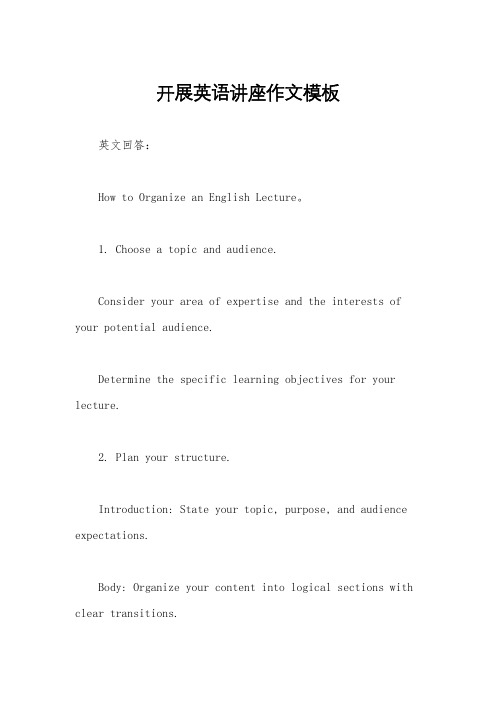
开展英语讲座作文模板英文回答:How to Organize an English Lecture。
1. Choose a topic and audience.Consider your area of expertise and the interests of your potential audience.Determine the specific learning objectives for your lecture.2. Plan your structure.Introduction: State your topic, purpose, and audience expectations.Body: Organize your content into logical sections with clear transitions.Conclusion: Summarize your main points and highlight their significance.3. Prepare your materials.Create high-quality visuals, such as slides, charts, or diagrams.Prepare handouts or other resources to supplement your presentation.Ensure that your materials are engaging and accessible.4. Practice your delivery.Rehearse your lecture multiple times to improve your timing and flow.Pay attention to your volume, tone, and body language.Consider using props or interactive activities toengage your audience.5. Engage your audience.Use interactive techniques, such as Q&A sessions or group discussions.Encourage audience participation through surveys or feedback mechanisms.Create a welcoming and respectful environment.6. Evaluate and improve.Collect feedback from your audience after the lecture.Identify areas for improvement and adjust your approach for future presentations.Additional Tips:Use clear and concise language.Cite your sources and provide references for further exploration.Use humor or personal anecdotes to make your lecture more memorable.Be enthusiastic and passionate about your topic.中文回答:如何开展英语讲座。
公共演讲英语名词解释汇总

公共演讲英语名词解释汇总以下是一些与公共演讲相关的英文名词及其解释:1. Audience(听众):指在演讲中接收信息的观众群体。
了解听众的特点、需求和期望,有助于演讲者更好地制定内容和掌握演讲效果。
2. Speech(演讲):指用语言表达观点、思想或故事的行为。
演讲可以包括正式的演讲稿、即兴演讲或辩论等形式。
3. Presentation(陈述):类似于演讲,但更强调通过视觉辅助工具(如幻灯片)来展示信息和观点。
演讲者通常使用演讲稿或提纲来指导陈述。
4. Preparation(准备):在演讲前做的工作,包括研究主题、收集资料、组织思路、编写演讲稿等。
充分的准备有助于演讲者增强自信和掌握内容。
5. Body Language(肢体语言):非语言的表达方式,如手势、面部表情、姿势等。
肢体语言可以加强演讲效果,使观众更好地理解和接受演讲者的信息。
6. Voice Projection(声音投射):指在演讲过程中用力发声以使声音传达到整个观众群体。
良好的声音投射可以增加演讲的力度和清晰度。
7. Engaging the Audience(吸引观众):通过使用互动和引人入胜的元素,如提问、故事、幽默等,来吸引观众的兴趣和参与,使演讲更有吸引力。
8. Eye Contact(眼神交流):指与观众建立视觉接触,通过目光交流来增强沟通效果。
良好的眼神交流可以建立信任感和与观众的联系。
9. Visual Aids(视觉辅助工具):在演讲中使用的图表、幻灯片、视频等可视化工具,用于支持演讲者的观点和解释。
10. Confidence(自信):指在演讲过程中展示出的坚定和自信的态度。
自信可以提高演讲者的说服力,增加观众对演讲内容的接受度。
11. Rhetoric (修辞):指演讲中使用的各种语言技巧和表达方式,如比喻、排比、反问等,用于增强语言的表现力和说服力。
12. Clarity (清晰度):指演讲内容表达上的明确性和易于理解性。
考研英语重点词汇详解preach
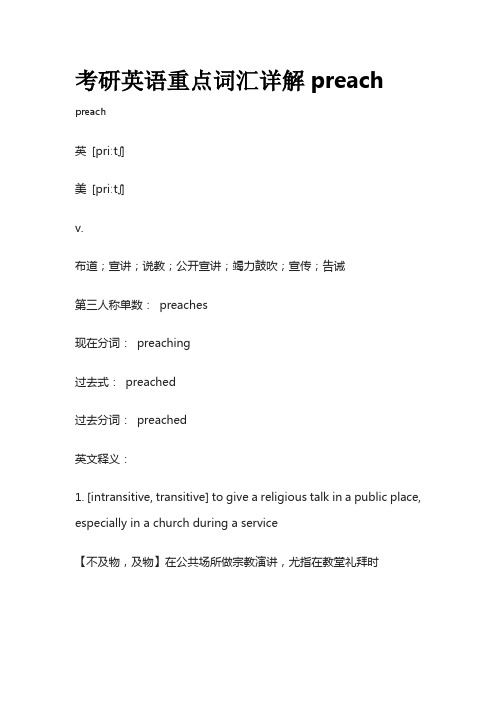
考研英语重点词汇详解preach preach英[priːtʃ]美[priːtʃ]v.布道;宣讲;说教;公开宣讲;竭力鼓吹;宣传;告诫第三人称单数:preaches现在分词:preaching过去式:preached过去分词:preached英文释义:1. [intransitive, transitive] to give a religious talk in a public place, especially in a church during a service【不及物,及物】在公共场所做宗教演讲,尤指在教堂礼拜时2. [transitive, intransitive] to tell people about a particular religion, way of life, system, etc. in order to persuade them to accept it【及物、不及物】告诉人们某一特定的宗教、生活方式、制度等。
为了说服他们接受它3. [intransitive] (disapproving) to give somebody advice on moral standards, behaviour, etc, especially in a way that they find annoying or boring【不及物动词】(不赞成)给某人道德标准、行为等方面的建议,尤指以他们觉得讨厌或无聊的方式举个例子:1."Don't preach at me," he shouted.“不要对我说教,”他喊道。
2.I'm sorry, I didn't mean to preach.很抱歉,我并没有说教的意思。
3.He said he was trying to preach peace and tolerance to his people.他说他正试图向他的人民宣扬和平与宽容。
演讲的英语短语
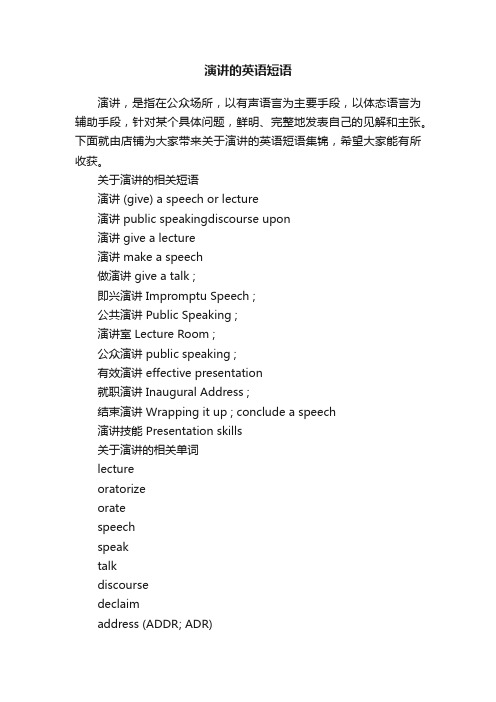
演讲的英语短语演讲,是指在公众场所,以有声语言为主要手段,以体态语言为辅助手段,针对某个具体问题,鲜明、完整地发表自己的见解和主张。
下面就由店铺为大家带来关于演讲的英语短语集锦,希望大家能有所收获。
关于演讲的相关短语演讲 (give) a speech or lecture演讲 public speakingdiscourse upon演讲 give a lecture演讲 make a speech做演讲 give a talk ;即兴演讲 Impromptu Speech ;公共演讲 Public Speaking ;演讲室 Lecture Room ;公众演讲 public speaking ;有效演讲 effective presentation就职演讲 Inaugural Address ;结束演讲 Wrapping it up ; conclude a speech演讲技能 Presentation skills关于演讲的相关单词lectureoratorizeoratespeechspeaktalkdiscoursedeclaimaddress (ADDR; ADR)speaking关于演讲的词语辨析lecture, speech, oration, address, report, talk这组词都有“演讲,讲话,报告”的意思,其区别是:lecture 侧重带学术性的演讲。
speech 普通用词,指一般的发言或讲话,可以是事先准备的,也可以是即席的。
oration 常指在特殊场合,辞藻华丽,形式庄重,旨在激发听众感情的正式演说。
address 正式用词,指在庄严隆重的场合作精心准备的演讲或正式演说。
report 一般是指下级给上级或负责人给委托机关的书面或口头报告。
talk 常用词,强调非正式讲话,讲话方式一般较为自由。
关于演讲的相关例句1. In an emotionally charged speech, he said he was resigning.在一次煽情的演讲中,他说他要辞职。
lecture的意思用法大全

lecture的意思用法大全lecture有演讲,训斥,教训的意思。
那你们想知道lecture的用法吗?今天给大家带来了lecture的用法,希望能够帮助到大家,一起来学习吧。
lecture的意思n. 演讲,训斥,教训vi. 作演讲vt. 给…作演讲,教训(通常是长篇大论的)变形:过去式: lectured; 现在分词:lecturing; 过去分词:lectured;lecture用法lecture可以用作名词lecture主要指教育性或学术性“演讲”,引申可指“冗长的训斥或谴责”。
lecture是可数名词,其后接介词on或about ,意为“关于…的演讲”“就…做演讲”“因…训斥或谴责某人”。
lecture作“讲演,讲课”解时,是不及物动词。
说“讲授某课程”时常与介词on连用,说“在某地讲演”时常与介词at〔in〕连用。
lecture用作名词的用法例句She ran over her notes before giving the lecture.她讲课前把讲稿匆匆看了一遍。
His lecture covered various aspects of language.他的讲课涉及到语言诸方面的问题。
They could not follow the lecture.他们听不懂这次演讲。
lecture可以用作动词lecture作“讲演,讲课”解时,是不及物动词。
说“讲授某课程”时常与介词on连用,说“在某地讲演”时常与介词at〔in〕连用。
lecture也可用作及物动词,意思是“向…讲演,给…讲课”,接名词或代词作宾语。
lecture还可作“责备”“教训”“训斥”解,用作及物动词,接名词或代词作宾语。
“因…而受到训斥”可说lecture sb for n./v -ing。
lecture用作动词的用法例句It was a shame for me to be lectured in front of the whole class.当着整个班级的面被训斥了一顿,真让我感到羞辱。
一场有趣的讲座英语作文

一场有趣的讲座英语作文英文回答:An Engaging Lecture.I attended an engaging lecture recently that left a lasting impression on me. The topic was "The Importance of Critical Thinking." The speaker, a renowned philosopher, captivated the audience with his eloquent delivery and thought-provoking insights.The lecture began with a discussion of the definition and nature of critical thinking. The speaker emphasizedthat it is not merely about being skeptical or argumentative. Instead, it is a disciplined process of thinking that involves careful analysis, logical reasoning, and open-mindedness. He argued that critical thinking is essential for making informed decisions, solving problems, and understanding the world around us.The speaker then presented several examples of critical thinking in action. He discussed how scientists use it to test hypotheses and advance knowledge, how historians useit to interpret events and draw conclusions, and how lawyers use it to build strong cases and defend their clients. He emphasized that critical thinking is notlimited to academic pursuits but can be applied to all aspects of life.One of the most memorable points the speaker made was the importance of questioning assumptions. He argued that we should not blindly accept what we are told or what we read but instead should subject it to critical scrutiny. He provided examples of how unquestioned assumptions can lead to errors in judgment and misunderstandings.The speaker also discussed the challenges to critical thinking. He acknowledged that it can be difficult to remain objective and open-minded in the face of strong emotions or biases. He emphasized the importance of recognizing and addressing these challenges and of striving to think clearly and rationally.The lecture concluded with a call to action. The speaker urged the audience to embrace critical thinking as a lifelong habit. He argued that it is the key to making informed decisions, solving complex problems, and living a fulfilling and meaningful life.The lecture was a truly enriching experience. It challenged my thinking and expanded my understanding of critical thinking. I left feeling inspired and motivated to apply the principles I had learned to my own life.中文回答:一场有趣的讲座。
英语讲座的目的英语作文
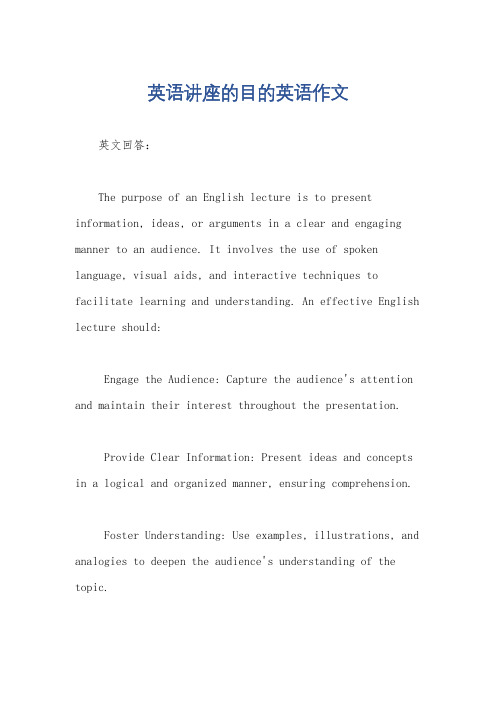
英语讲座的目的英语作文英文回答:The purpose of an English lecture is to present information, ideas, or arguments in a clear and engaging manner to an audience. It involves the use of spoken language, visual aids, and interactive techniques to facilitate learning and understanding. An effective English lecture should:Engage the Audience: Capture the audience's attention and maintain their interest throughout the presentation.Provide Clear Information: Present ideas and concepts in a logical and organized manner, ensuring comprehension.Foster Understanding: Use examples, illustrations, and analogies to deepen the audience's understanding of the topic.Stimulate Critical Thinking: Encourage the audience to question ideas, evaluate evidence, and form their own conclusions.Enhance Communication Skills: Develop the audience's listening, comprehension, and note-taking abilities.Promote Active Learning: Engage the audience in discussions, Q&A sessions, or group activities to reinforce learning.Utilize Visual Aids: Employ slides, handouts, videos, or other visual materials to support and enhance the presentation.Adapt to the Audience: Tailor the content and delivery to match the interests, knowledge level, and cultural background of the audience.Respect Diverse Perspectives: Acknowledge and address different viewpoints, fostering a respectful learning environment.中文回答:英语演讲的目的:英语演讲的目的是向听众清晰而有吸引力地展示信息、想法或论点。
lecture的意思用法大全

lecture的意思用法大全lecture有演讲,训斥,教训的意思。
那你们想知道lecture的用法吗?今天给大家带来了lecture的用法,希望能够帮助到大家,一起来学习吧。
lecture的意思n. 演讲,训斥,教训vi. 作演讲vt. 给…作演讲,教训(通常是长篇大论的)变形:过去式: lectured; 现在分词:lecturing; 过去分词:lectured;lecture用法lecture可以用作名词lecture主要指教育性或学术性“演讲”,引申可指“冗长的训斥或谴责”。
lecture是可数名词,其后接介词on或about ,意为“关于…的演讲”“就…做演讲”“因…训斥或谴责某人”。
lecture作“讲演,讲课”解时,是不及物动词。
说“讲授某课程”时常与介词on连用,说“在某地讲演”时常与介词at〔in〕连用。
lecture用作名词的用法例句She ran over her notes before giving the lecture.她讲课前把讲稿匆匆看了一遍。
His lecture covered various aspects of language.他的讲课涉及到语言诸方面的问题。
They could not follow the lecture.他们听不懂这次演讲。
lecture可以用作动词lecture作“讲演,讲课”解时,是不及物动词。
说“讲授某课程”时常与介词on连用,说“在某地讲演”时常与介词at〔in〕连用。
lecture也可用作及物动词,意思是“向…讲演,给…讲课”,接名词或代词作宾语。
lecture还可作“责备”“教训”“训斥”解,用作及物动词,接名词或代词作宾语。
“因…而受到训斥”可说lecture sb for n./v -ing。
lecture用作动词的用法例句It was a shame for me to be lectured in front of the whole class.当着整个班级的面被训斥了一顿,真让我感到羞辱。
讲座有用的英语作文
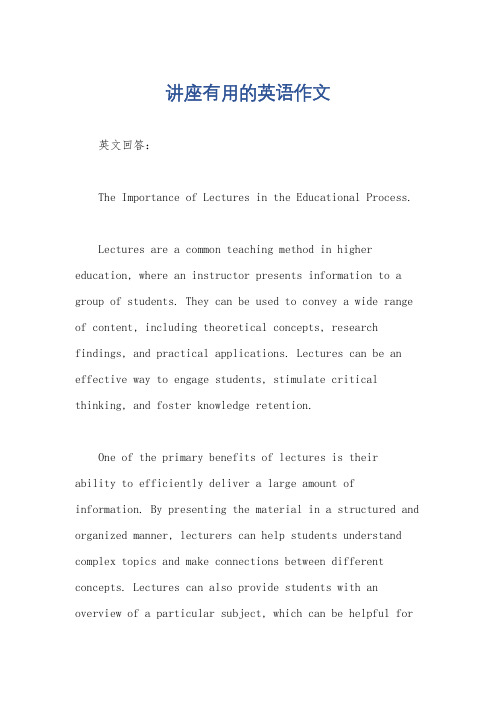
讲座有用的英语作文英文回答:The Importance of Lectures in the Educational Process.Lectures are a common teaching method in higher education, where an instructor presents information to a group of students. They can be used to convey a wide range of content, including theoretical concepts, research findings, and practical applications. Lectures can be an effective way to engage students, stimulate critical thinking, and foster knowledge retention.One of the primary benefits of lectures is theirability to efficiently deliver a large amount of information. By presenting the material in a structured and organized manner, lecturers can help students understand complex topics and make connections between different concepts. Lectures can also provide students with an overview of a particular subject, which can be helpful fordeveloping a foundation for further study.Another advantage of lectures is their potential for interactivity. While traditional lectures may involve the instructor simply reading from a script, more engaging lectures incorporate interactive elements such as questions, discussions, and demonstrations. This allows students to actively participate in the learning process and clarifyany misunderstandings they may have.Furthermore, lectures can help students develop their critical thinking skills. By presenting different perspectives and arguments, lecturers encourage students to evaluate information critically and form their own opinions. Lectures can also provide a platform for students to ask questions and engage in discussions, which can foster intellectual curiosity and a deeper understanding of the material.In addition to their cognitive benefits, lectures can also play a role in fostering student engagement. By presenting the material in an engaging and stimulating way,lecturers can capture students' attention and make the learning experience more enjoyable. This can lead to increased student motivation and a desire to delve deeper into the subject matter.However, it is important to note that lectures are not without their limitations. One potential drawback is that they can be passive learning experiences, where students simply listen and take notes. To address this, instructors should incorporate interactive elements and encourage student participation. Additionally, lectures can be less effective for students who have difficulty with auditory processing or who prefer more hands-on learning experiences.Overall, lectures can be a valuable teaching method in higher education when used effectively. By presenting information in a structured and engaging manner, lectures can help students acquire knowledge, develop critical thinking skills, and foster intellectual curiosity. While there are some limitations to consider, instructors can overcome these by incorporating interactive elements and adapting their lectures to meet the needs of their students.中文回答:讲座在教育过程中的重要性。
英语专业八级mini-lecture讲座常见问题及应试策略
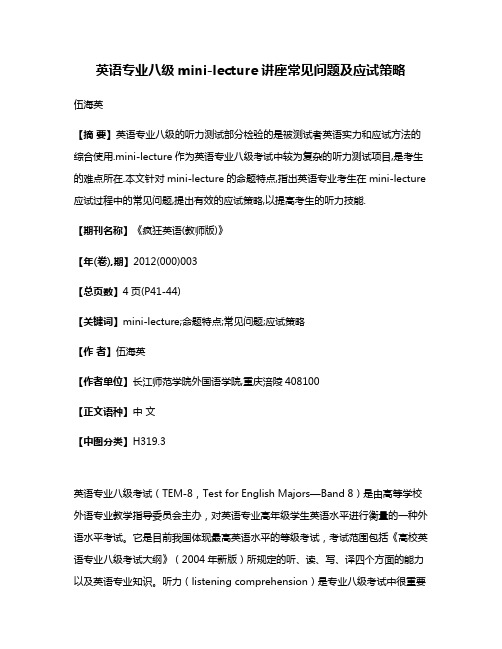
英语专业八级mini-lecture讲座常见问题及应试策略伍海英【摘要】英语专业八级的听力测试部分检验的是被测试者英语实力和应试方法的综合使用.mini-lecture作为英语专业八级考试中较为复杂的听力测试项目,是考生的难点所在.本文针对mini-lecture的命题特点,指出英语专业考生在mini-lecture 应试过程中的常见问题,提出有效的应试策略,以提高考生的听力技能.【期刊名称】《疯狂英语(教师版)》【年(卷),期】2012(000)003【总页数】4页(P41-44)【关键词】mini-lecture;命题特点;常见问题;应试策略【作者】伍海英【作者单位】长江师范学院外国语学院,重庆涪陵408100【正文语种】中文【中图分类】H319.3英语专业八级考试(TEM-8,Test for English Majors—Band 8)是由高等学校外语专业教学指导委员会主办,对英语专业高年级学生英语水平进行衡量的一种外语水平考试。
它是目前我国体现最高英语水平的等级考试,考试范围包括《高校英语专业八级考试大纲》(2004年新版)所规定的听、读、写、译四个方面的能力以及英语专业知识。
听力(listening comprehension)是专业八级考试中很重要的一个内容,由三个部分组成:Section A mini-lecture;Section B Interview;Section C News broadcast。
这三部分试题共20分,占总分的20%,考试用时约35分钟。
讲座(minilecture)由一个约900个单词的讲座和一项填空任务组成,要求学生边听边做笔记,然后完成10个填空任务,答题时间10分钟。
本文将针对mini-lecture的命题特点,指出英语专业学生在mini-lecture中的常见问题,提出有效的应试策略,以提高学生的听力技能。
1. mini-lecture讲座命题特点分析1.1 题材多样,内容真实根据2004年修订的高校英语专业八级考试大纲规定,讲座部分的内容与英语专业知识课程相关,能听懂有关政治、经济历史、文化、教育、语言文学、科普方面的演讲。
讲座的意义英语作文
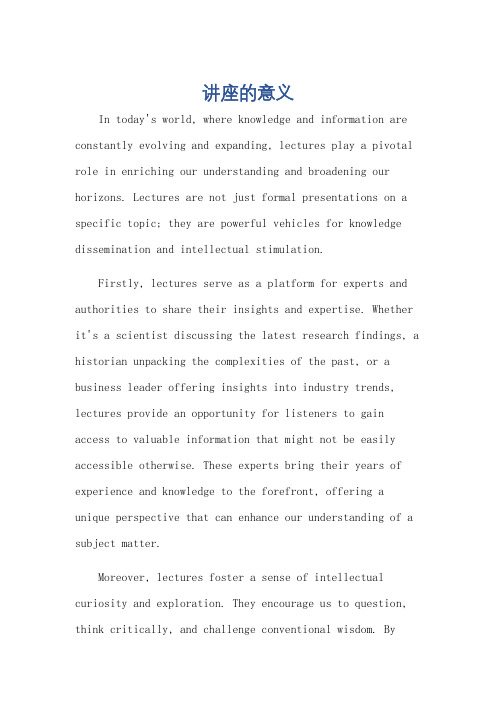
讲座的意义In today's world, where knowledge and information are constantly evolving and expanding, lectures play a pivotal role in enriching our understanding and broadening our horizons. Lectures are not just formal presentations on a specific topic; they are powerful vehicles for knowledge dissemination and intellectual stimulation.Firstly, lectures serve as a platform for experts and authorities to share their insights and expertise. Whether it's a scientist discussing the latest research findings, a historian unpacking the complexities of the past, or a business leader offering insights into industry trends, lectures provide an opportunity for listeners to gain access to valuable information that might not be easily accessible otherwise. These experts bring their years of experience and knowledge to the forefront, offering a unique perspective that can enhance our understanding of a subject matter.Moreover, lectures foster a sense of intellectual curiosity and exploration. They encourage us to question, think critically, and challenge conventional wisdom. Byposing thought-provoking questions and offering different viewpoints, lecturers inspire us to delve deeper into a topic, explore alternative perspectives, and broaden our intellectual horizons. This process not only enhances our cognitive abilities but also cultivates a mindset that is open to new ideas and continuous learning.Furthermore, lectures are often interactive and engaging, allowing for lively discussions and the exchange of ideas. This interaction creates a dynamic learning environment where participants can share their thoughts, ask questions, and engage in meaningful dialogues. Such exchanges not only enrich the learning experience but also foster a sense of community and connection among the participants.Additionally, lectures can serve as a source of inspiration and motivation. By hearing stories of success, overcoming challenges, and achieving goals, we can be inspired to pursue our own passions and dreams. Lecturers often share their personal journeys, highlighting the importance of perseverance, resilience, and continuous effort. These stories can be a powerful reminder that withdedication and hard work, we can achieve our desired outcomes.In conclusion, lectures play a significant role in our personal and intellectual growth. They provide access to valuable information, foster intellectual curiosity, create interactive learning environments, and serve as sources of inspiration. By attending lectures, we can enhance our knowledge, broaden our horizons, and develop a mindset that is open to new ideas and continuous learning.**讲座的意义**在当今知识和信息日新月异的世界里,讲座在丰富我们的理解、拓宽我们的视野方面发挥着关键作用。
英语讲座的意义英语作文
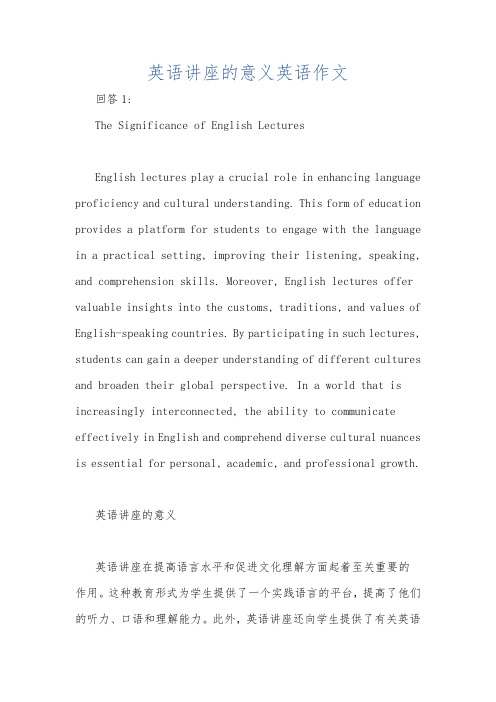
英语讲座的意义英语作文回答1:The Significance of English LecturesEnglish lectures play a crucial role in enhancing language proficiency and cultural understanding. This form of education provides a platform for students to engage with the language in a practical setting, improving their listening, speaking, and comprehension skills. Moreover, English lectures offer valuable insights into the customs, traditions, and values of English-speaking countries. By participating in such lectures, students can gain a deeper understanding of different cultures and broaden their global perspective. In a world that is increasingly interconnected, the ability to communicate effectively in English and comprehend diverse cultural nuances is essential for personal, academic, and professional growth.英语讲座的意义英语讲座在提高语言水平和促进文化理解方面起着至关重要的作用。
英语讲座的意义英语作文
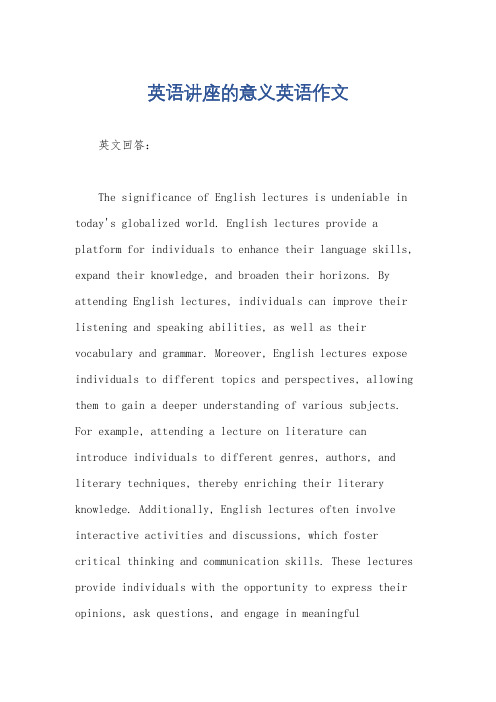
英语讲座的意义英语作文英文回答:The significance of English lectures is undeniable in today's globalized world. English lectures provide a platform for individuals to enhance their language skills, expand their knowledge, and broaden their horizons. By attending English lectures, individuals can improve their listening and speaking abilities, as well as their vocabulary and grammar. Moreover, English lectures expose individuals to different topics and perspectives, allowing them to gain a deeper understanding of various subjects. For example, attending a lecture on literature can introduce individuals to different genres, authors, and literary techniques, thereby enriching their literary knowledge. Additionally, English lectures often involve interactive activities and discussions, which foster critical thinking and communication skills. These lectures provide individuals with the opportunity to express their opinions, ask questions, and engage in meaningfulconversations. This not only improves their language proficiency but also enhances their ability to articulate their thoughts and ideas effectively. Overall, English lectures play a crucial role in promoting language learning, intellectual growth, and cultural exchange.中文回答:英语讲座在当今全球化的世界中具有不可忽视的意义。
演讲的英语短语
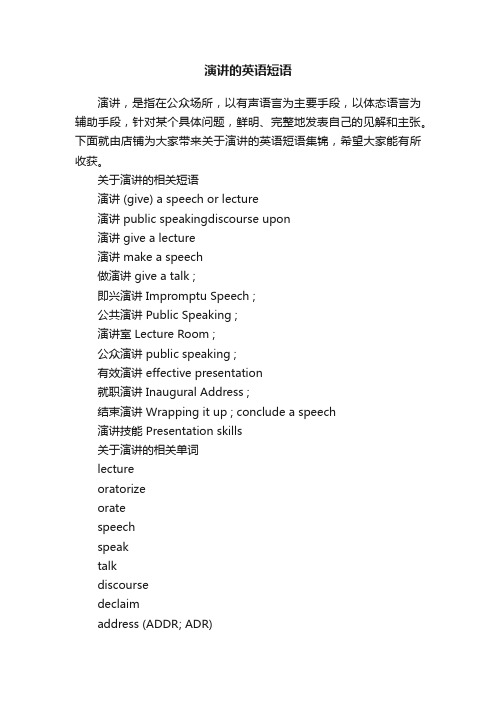
演讲的英语短语演讲,是指在公众场所,以有声语言为主要手段,以体态语言为辅助手段,针对某个具体问题,鲜明、完整地发表自己的见解和主张。
下面就由店铺为大家带来关于演讲的英语短语集锦,希望大家能有所收获。
关于演讲的相关短语演讲 (give) a speech or lecture演讲 public speakingdiscourse upon演讲 give a lecture演讲 make a speech做演讲 give a talk ;即兴演讲 Impromptu Speech ;公共演讲 Public Speaking ;演讲室 Lecture Room ;公众演讲 public speaking ;有效演讲 effective presentation就职演讲 Inaugural Address ;结束演讲 Wrapping it up ; conclude a speech演讲技能 Presentation skills关于演讲的相关单词lectureoratorizeoratespeechspeaktalkdiscoursedeclaimaddress (ADDR; ADR)speaking关于演讲的词语辨析lecture, speech, oration, address, report, talk这组词都有“演讲,讲话,报告”的意思,其区别是:lecture 侧重带学术性的演讲。
speech 普通用词,指一般的发言或讲话,可以是事先准备的,也可以是即席的。
oration 常指在特殊场合,辞藻华丽,形式庄重,旨在激发听众感情的正式演说。
address 正式用词,指在庄严隆重的场合作精心准备的演讲或正式演说。
report 一般是指下级给上级或负责人给委托机关的书面或口头报告。
talk 常用词,强调非正式讲话,讲话方式一般较为自由。
关于演讲的相关例句1. In an emotionally charged speech, he said he was resigning.在一次煽情的演讲中,他说他要辞职。
- 1、下载文档前请自行甄别文档内容的完整性,平台不提供额外的编辑、内容补充、找答案等附加服务。
- 2、"仅部分预览"的文档,不可在线预览部分如存在完整性等问题,可反馈申请退款(可完整预览的文档不适用该条件!)。
- 3、如文档侵犯您的权益,请联系客服反馈,我们会尽快为您处理(人工客服工作时间:9:00-18:30)。
讲座用英语怎么说
讲座,是由主讲人向学员传授某方面的知识的一种公开半公开的学习形式。
那么你知道讲座用英语怎么说吗?下面跟一起学习讲座的英语知识吧。
lecture
cathedra
讲座的相关短语学术讲座academic forum ; Academic lecture ; Academic Seminar ; Lecture
系列讲座series of lectures ; Lecture Series ; Seminar Series ; Series (or set) of lectures
做讲座give lectures ; give a lecture ; Do lectures ; A lecture 研究讲座Faculty Research Lecturer ; Research Chair Professor ; Research Seminar
大师讲座Master Class ; Daryls New Millennium World Tour Lecture
国家讲座national chair professors ; national chair professorship;national chair professors
讲座通知Report Notice
知识讲座Lecture ; Knowledge Lectures ; Chiar ; knowledge lecture
稀有讲座The Ali Bongo Lecture ; Michael Weber - International Lecture
讲座的英语例句1. He was much in demand as a lecturer in the US.
他的讲座在美国很受欢迎。
2. This year's event consisted of readings, lectures and workshops.
今年的活动包括读书会、讲座和研讨会。
3. He will be devoting more time to writing, broadcasting and lecturing.
他将把更多时间用于写作、广播和作讲座。
4. Within this lecture I cannot pretend to deal adequately with dreams.
在这一次讲座中,我不敢自诩能对梦境作透彻的分析。
5. They just sat there wittering about what lectures they had tomorrow.
他们就坐在那儿没完没了地聊明天要听哪些讲座。
6. His lecture was so pedantic and uninteresting.
他的讲座学究气太浓,没意思。
7. a day school at Leeds University on women in Victorian times
利兹大学为期一天的关于维多利亚时代妇女的专题讲座
8. Teaching is by lectures and seminars.
教学形式为讲座和研讨课。
9. What made you stop away from that lecture?
你为什么不去听那次讲座?
10. I felt my attention wandering during the lecture.
我感到听讲座时老走神.
11. She yawned during the lecture.
她听讲座时一直在打呵欠.
12. The lecture was as dull as ditchwater.
那次讲座非常呆板乏味.
13. Attendance at the lecture is optional.
这一讲座可随意参加.
14. This is a two year course taught by means of lectures and seminars.
本课程为期两年,授课形式为讲座与研讨。
15. He was distributing handbills announcing his lecture when Nora caught her first glimpse of him.
诺拉第一次看见他时,他正在散发自己的讲座宣传单。
